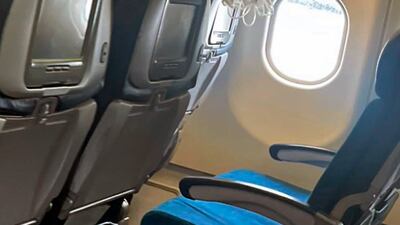Thirty-six people were injured, 11 seriously, when severe turbulence rocked a Hawaiian Airlines flight to Honolulu from Phoenix on Sunday.
An airline official called the incident isolated and unusual, AP reported.
Jon Snook, the airline's chief operating officer, said the airline hasn't experienced “an incident of this nature in recent history”.
The flight was full, carrying 278 passengers and 10 crew members, he said.
Jim Ireland, director of the Honolulu Emergency Medical Services Department, said 36 people received treatment, including those with nausea or minor injuries.
He said 20 people were taken to hospital, including 11 deemed to be seriously injured.
Three flight attendants were among those injured.
Mr Ireland said: “We feel fortunate that there were not any deaths or other critical injuries. And we’re also very hopeful that all will make a full recovery.”
Passenger Kaylee Reyes told Hawaii News Now that her mother had just sat down when the turbulence hit and did not have a chance to buckle her safety belt.
“She flew up and hit the ceiling,” Ms Reyes said.
Mr Snook said there was some internal damage to the aircraft. The seatbelt sign was on at the time of the incident, although some of those injured weren't wearing their seatbelts, he said.
Thomas Vaughan, a meteorologist with the National Weather Service in Honolulu, said there had been a weather advisory for thunderstorms that included Oahu and areas on the flight path.
No warning
The airline was aware of the weather forecast and the unstable air and weather conditions, but had no warning the particular patch of air where the turbulence occurred "was in any way dangerous,” Mr Snook said.
He didn't know how much altitude the plane lost during the turbulence, saying that would be part of an investigation involving the National Transportation Safety Board. The plane's flight data recorder would provide those details, he said.
The Airbus A330-200 began its descent immediately after the turbulence and crew declared an emergency due to the number of injuries on board, he said. Air traffic controllers gave the flight priority to land.
The aircraft will undergo a thorough inspection and maintenance, mostly to fix components in the cabin, Mr Snook said.
Mr Snook said he could only speculate whether some passengers hit their heads, but that was probable based on the injuries and the damage to cabin panelling.
“If you don’t have your seatbelt on, you stay where you are as the aircraft goes down and that’s how those injuries occur,” Mr Snook said.
The investigation will examine what other measures were taken, aside from turning on the fasten seatbelt sign, to ensure passengers were buckled in, he said.

